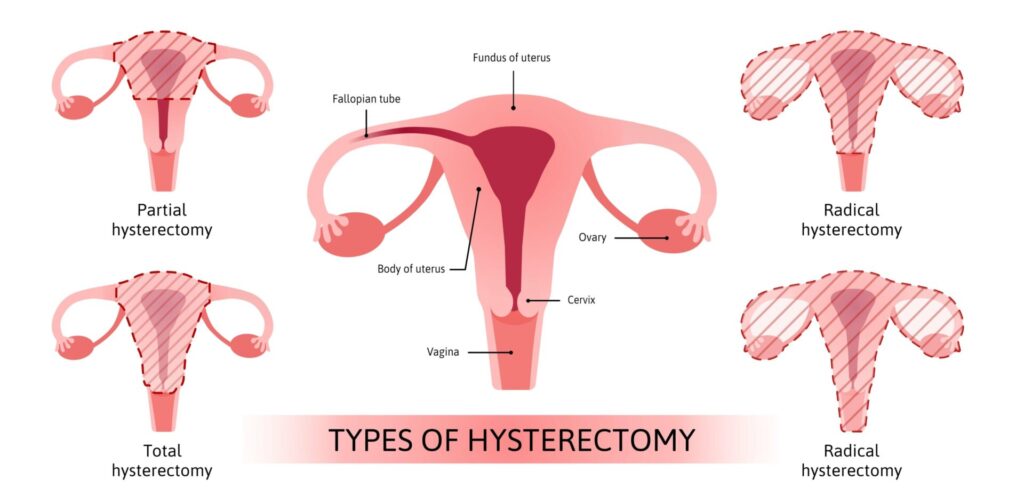Understanding the legal options in mismanaged hysterectomy cases is crucial for patients who have faced complications from this significant surgical procedure. A hysterectomy, while often necessary for health reasons, carries inherent risks and potential for medical errors. When mismanagement occurs, whether through surgical errors, incorrect procedure choices, or post-operative care lapses, the consequences can be severe, impacting a patient’s health, fertility, and overall well-being.
Knowledge of legal avenues is essential in these situations, providing patients with the means to seek compensation and justice for their suffering. This blog post aims to shed light on these legal options, emphasizing the importance of informed decision-making for patients who have undergone a hysterectomy and experienced adverse outcomes due to medical mismanagement.
If you’ve experienced medical malpractice, whether it’s a misdiagnosis, surgical error, or nursing home neglect, The Pagan Law Firm in New York is here to stand by your side. Our experienced team handles a wide range of cases, ensuring that your rights are protected. As a trusted law firm in New York, we’ve successfully fought for many in similar situations. Don’t navigate this alone—reach out for a free case evaluation today.
👉Also Read: Surgical Errors and Wrong Patients: Understanding Your Rights in Medical Malpractice Lawsuits
Hysterectomy: A Vital Surgical Procedure

A hysterectomy, one of the most common surgical procedures for women, involves the removal of the uterus and sometimes includes the cervix, ovaries, and fallopian tubes. This operation is a vital healthcare intervention, often performed to address various medical conditions that impact a woman’s reproductive system.
It can be a life-saving procedure for conditions like uterine or ovarian cancer, and is also commonly used to treat benign but problematic issues such as uterine fibroids, endometriosis, and uterine prolapse. By resolving these conditions, a hysterectomy can significantly improve the quality of life for many women, alleviating chronic pain, heavy bleeding, and other debilitating symptoms.
However, its importance is underscored by the fact that it is a major surgery, one that necessitates careful consideration and understanding due to its potential impact on a woman’s physical and emotional health, including her fertility. Therefore, its execution and management require the highest standards of medical care.
Types of Hysterectomy

There are several types of hysterectomy procedures, each involving the removal of the uterus. The common types include:
Total Hysterectomy: Removal of the entire uterus, including the cervix.
Subtotal or Partial Hysterectomy: Removal of the upper part of the uterus, leaving the cervix intact.
Total Hysterectomy with Salpingo-Oophorectomy: In addition to removing the uterus, this procedure involves removing the fallopian tubes and ovaries.
Radical Hysterectomy: Typically performed for certain cancers, it involves the removal of the uterus, surrounding tissues, part of the vagina, and supporting structures.
Supracervical or Subtotal Hysterectomy: Removal of the upper portion of the uterus while leaving the cervix in place.
The choice of hysterectomy type depends on various factors, including the patient’s health, medical condition, and the reason for the procedure. It’s essential for individuals to discuss the options thoroughly with their healthcare provider to make informed decisions.
Reasons for Hysterectomy
Hysterectomies are performed for several medical reasons, often as a treatment for conditions affecting a woman’s reproductive system. Some of the common reasons include:
Uterine Fibroids: These noncancerous growths in the uterus can cause severe pain, heavy menstrual bleeding, and other symptoms like frequent urination. A hysterectomy may be recommended when these symptoms are severe and other treatments haven’t been effective.
Uterine Prolapse: This occurs when the uterus slips from its normal position into the vaginal canal, often due to weakened pelvic floor muscles. It can lead to urinary problems, pelvic pressure, and trouble with bowel movements. A hysterectomy can provide relief when less invasive treatments fail.
Ovarian Cancer: In cases of ovarian cancer, a hysterectomy may be part of a broader treatment plan. It involves the removal of the uterus, cervix, ovaries, and fallopian tubes to prevent the spread of cancer.
Endometriosis: This condition, where uterine tissue grows outside the uterus, can cause severe pain and infertility. If other treatments are unsuccessful, a hysterectomy may be considered to alleviate symptoms.
Abnormal Vaginal Bleeding: When vaginal bleeding cannot be controlled with other treatments, a hysterectomy might be necessary. This bleeding can be due to hormonal imbalances, cancer, or fibroids.
Chronic Pelvic Pain: In certain cases, when chronic pelvic pain is linked to conditions like adenomyosis or endometriosis and is unresponsive to other treatments, a hysterectomy may be the only relief option.
Each of these conditions presents unique challenges and considerations, making the decision to undergo a hysterectomy a significant one. It’s essential for patients to thoroughly discuss with their healthcare providers to understand the best course of action for their specific medical situation.
Potential Complications and Mismanagement
While a hysterectomy can be a life-altering procedure for many women, it is not without its risks. Understanding the potential complications and instances of mismanagement is crucial for patients undergoing this surgery.
Surgical Errors: These can occur during the operation and may include accidental damage to surrounding organs such as the bladder, intestines, or ureters. Such errors can lead to significant long-term health issues and may require additional surgeries to correct.
Improper Removal of Organs: In some cases, organs adjacent to the uterus, such as the ovaries or fallopian tubes, may be removed unnecessarily or without the patient’s consent. This can lead to hormonal imbalances, early menopause, and other health complications.
Infections: Post-surgical infections are a risk with any operation, including hysterectomies. These infections can range from minor wound infections to more serious internal infections, potentially leading to prolonged hospital stays or additional treatments.
Postoperative Hemorrhage: Excessive bleeding during or after surgery is a significant risk. It can lead to anemia, the need for blood transfusions, and in severe cases, further surgical intervention.
Anesthesia Complications: As with any surgery requiring anesthesia, there’s a risk of adverse reactions, including respiratory issues or allergic reactions.
Long-Term Health Effects: These may include chronic pain, sexual dysfunction, or psychological impacts such as depression, particularly if the hysterectomy leads to early menopause.
When these complications arise from medical negligence or mismanagement, such as a failure to follow surgical protocols or inadequate post-operative care, they can form the basis for a medical malpractice claim. Patients facing such situations are often left dealing not only with physical harm but also with the emotional and financial burdens of additional medical care and potential loss of quality of life. In such cases, seeking legal redress can be an important step in addressing these consequences.
👉Also Read: Seeking Justice: How to File a Medical Malpractice Claim for Birth Injury – The Pagan Law Firm
Legal Recourse for Mismanaged Hysterectomy Cases
For patients who have suffered due to mismanagement during hysterectomy procedures, understanding the available legal recourse is critical. Medical malpractice law provides a pathway for patients to seek compensation and justice when they have been harmed due to negligence or substandard medical care.
In cases of hysterectomy mismanagement, legal action typically revolves around proving that the healthcare provider failed to meet the accepted standard of care. This might involve demonstrating that the surgeon made avoidable errors during the procedure, such as damaging surrounding organs, or that there was a failure in post-operative care leading to infections or other complications. It could also include instances where informed consent was not adequately obtained, with the patient not being fully apprised of the risks or alternatives to the procedure.
To pursue a medical malpractice claim, patients typically need to establish several key points: a duty of care existed, the standard of care was breached, and this breach directly caused harm or injury. This process often involves gathering detailed medical records, expert testimonies, and other relevant evidence.
Legal claims for mismanaged hysterectomy can result in compensation for medical expenses, lost wages, pain and suffering, and other damages. It’s advisable for affected patients to consult with experienced medical malpractice attorneys to understand their rights and the best course of action. They can provide the necessary legal assistance and support to navigate these complex cases effectively.
The Role of The Pagan Law Firm in Medical Malpractice Cases
At The Pagan Law Firm, we have a strong focus on medical malpractice, particularly intricate cases like hysterectomies. Our deep understanding of both medical and legal intricacies positions us as dedicated advocates for patients impacted by mismanagement.
Our proficiency includes meticulous analysis of medical records, identifying deviations from standard care, and comprehending the long-term implications of surgical mishaps. Our attorneys excel in interpreting medical terminologies, ensuring accurate representation in legal proceedings.
In cases of hysterectomy mismanagement, we adopt a thorough approach, initiating with an in-depth consultation to grasp the patient’s experience and the surgery’s impact. Recognizing the sensitivity, we handle each case with empathy and confidentiality, offering support and understanding.
Our legal strategy includes collaborating with medical experts to fortify the case. These medical experts provide crucial insights into breached standards of care and resulting harm. This collaboration is pivotal in articulating case complexities to a jury or judge.
Moreover, we navigate medical malpractice litigation challenges adeptly, understanding defense team tactics and countering them effectively. Our goal is not just seeking rightful compensation but also upholding a medical care standard to prevent future negligence instances.
Steps in Pursuing Legal Action
For patients seeking legal action in mismanaged hysterectomy cases, the following steps are crucial:
Gathering Medical Records: Patients need to collect all relevant medical documents, including surgical notes, hospital records, and post-operative care details. These records form the foundation of the case.
Finding Expert Witnesses: Securing testimony from medical experts in gynecology and surgical procedures is vital. These professionals can provide an authoritative opinion on the standard of care expected and how the practitioner’s actions deviated from this standard.
Filing a Lawsuit: Once sufficient evidence is gathered, the next step is filing a medical malpractice lawsuit. This legal document officially starts the litigation process and outlines the allegations against the healthcare provider or institution.
Building a Strong Case: This entails thorough trial preparation, including crafting legal arguments, conducting depositions, and devising strategies for compelling evidence presentation. This critical phase underscores the invaluable role of a medical malpractice lawyer’s proficiency, as they strive to construct a compelling narrative that vividly illustrates the connection between medical mismanagement and the patient’s suffering.
Each of these steps requires careful planning and execution. With the guidance of experienced medical malpractice attorneys, patients can navigate this challenging journey more effectively, ensuring that their voice is heard and their rights are upheld.
Compensation and Justice
A successful legal action in a mismanaged hysterectomy case can lead to various forms of compensation and a sense of justice for the patient. The primary aim of such legal proceedings is to hold the responsible parties accountable and to provide restitution to the patient for the harm suffered.
Financial Compensation
This is often the most immediate and tangible form of redress. Financial compensation can cover a range of economic damages, including:
Medical Expenses: Reimbursement for all medical costs incurred due to the mismanagement, including costs for corrective surgeries, ongoing treatment, and rehabilitation.
Lost Wages: Compensation for time off work and loss of earning capacity, especially if the patient is unable to return to their previous employment due to the complications.
Future Medical Care: In cases of long-term health implications, compensation can include future medical expenses like ongoing care, therapy, or medication.
Apart from these economic damages, patients may also be entitled to non-economic damages, which are more subjective and include:
Pain and Suffering: Compensation for physical pain and emotional distress resulting from the surgical complications.
Loss of Quality of Life: Recognition of the reduced quality of life due to chronic pain, infertility, or other long-term health issues.
Beyond the financial aspect, successful legal action represents a form of justice. It acknowledges the suffering and hardship endured by the patient due to the medical negligence. It also serves as a deterrent, reinforcing the importance of adherence to medical standards and care protocols in the medical community.
Trusted Advocates in New York for Complex Medical Malpractice Cases
Embark on the journey to justice with The Pagan Law Firm in New York. Navigating medical malpractice, particularly in intricate cases like hysterectomies, our committed team stands as your shield. Beyond legal representation, we are devoted to reinstating dignity and control for those impacted by medical negligence. Your empowerment starts here. Contact us today.

